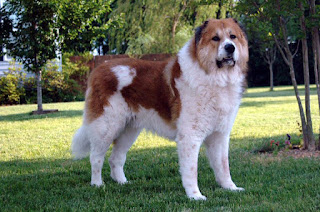The Caucasian Shepherd Dog is a
large breed of dog that is popular in Russia, Armenia, Azerbaijan, and Georgia.
It is extremely popular in Georgia, which has always been the principal region
of penetration of Caucasian shepherd dogs. The official standard of this breed
is fundamentally based on the dogs taken from Georgia.
Because
the dog breed was registered by the USR, the FCI standard of this breed
indicates that its origin is the USSR. However, the breed is native to
countries of the Caucasus region including Georgia, Armenia, and Azerbaijan.
Description
Appearance
Also
known as Caucasian Ovcharka or Baskhan (Karachay) pariy, Caucasian shepherd
dogs are strongly boned, muscular, and even-tempered molossers. Plain dogs have
a shorter coat and appear taller as they are more lightly built. Mountain dog
types have a heavier coat and are more muscularly built. Caucasian ovcharka are
large dogs; however, there is no recorded maximum height or weight. The minimum
height for females is 64 centimetres (25 in), with a desirable height between
67 and 70 centimetres (26 and 28 in).
The minimum
weight for females is 45 kilograms (99 lb). The minimum height for males is 68
centimetres (27 in), with a desirable height between 72 and 75 centimetres (28
and 30 in). The minimum weight for males is 50 kilograms . The Caucasian shepherd
is rather intelligent; however, they can be insolent and refuse to listen at
times. They also can be fairly aggressive towards people they do not know and
with incorrect handling this can be problematic. This can be overcome by proper
training.
Health
The
Caucasian Shepherd Dog is generally healthy and long-lived, averaging a life
span of 10–12 years. Some dogs may have health issues in the form of hip
dysplasia, obesity and occasional heart problems, but the majority of these
dogs are healthy if taken care of correctly. Good dog breeders use genetic
testing of their breeding stock to reduce the chances of diseases in the
puppies.
The
ears of the Caucasian Shepherd Dog are traditionally cropped, although some
modern dogs are unaltered, as many people believe that this practice is
unethical and cruel. If brought up by someone with extensive knowledge on the
needs of a Caucasian Shepherd Dog, the chances of health problems should lower
dramatically.
Exercise
and play time are a crucial part of the Caucasian Shepherd Dog's life to help
prevent obesity. Outdoor activities such as hiking, chasing balls and
retrieving flying discs can be a good outlet of releasing energy.
Training
Caucasian
Shepherd Dogs require very specific and detailed training. From the ages of 0–9
months the obedience of the dog has already been formed. It is recommended that
an expert begins to train the dog from the ages of 7–8 months old. The training
that is involved in this early stage should be light guidance on the teaching
of obedience.
Puppy
school has been described as a bad option for the Caucasian Shepherd Dog.They
do not tolerate other dogs very well and get out of control easily. This can be
difficult to manage even if they are still young. After the early stages and
training of a Caucasian Shepherd Dogs life, they can move on to learn about how
to herd different types of livestock and defend them if the situation arises.
It
is important to expose the dog to extensive amounts of socialization to teach
it that not all humans are enemies, starting this routine from a young age could
be helpful. Caucasian Shepherd Dogs are not recommended to be adopted into
families with young children because of their guardian instinct and powerful
bodies.
Breed classification
Fédération
Cynologique Internationale classification:
·
FCI Pinscher and Schnauzer, Molossoid and Swiss
Mountain Dog Group
·
Section 2: Molossian breeds
·
Section 2.2: Mountain types
·
Russia: Caucasian Shepherd Dog
·
The American Kennel Club include the breed in
the working group.
Dangers
The
aggressive nature of the Caucasian Ovcharka makes it one of the most risky dog
breeds to own for if not trained properly it will routinely snap at strangers
or anyone they perceive as a threat.






No comments:
Post a Comment